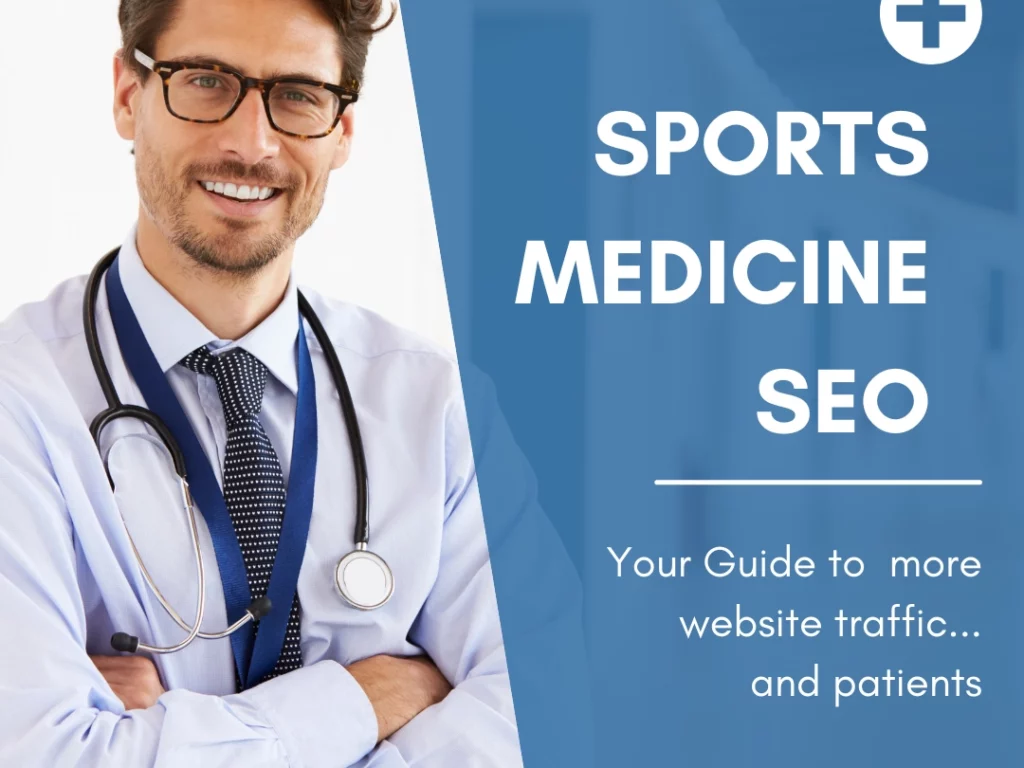Sports medicine SEO is an essential part of online marketing for clinics and practices in this specialized field of healthcare. With the growing demand for sports medicine services, it is important for practices to optimize their online presence to attract new patients and grow their business.
In this article, we will explore various strategies and best practices for sports medicine SEO.
The following sections will cover the most effective techniques for optimizing sports medicine websites for search engines:
- Keyword Research for Sports Medicine SEO
- On-Page Optimization for Sports Medicine Websites
- Link Building and Content Marketing for Sports Medicine SEO
- Local SEO for Sports Medicine Practices
- Orthopedic SEO
In addition to these specific techniques, we will also discuss the importance of SEO for doctors and healthcare providers.
By the end of this article, readers will have a clear understanding of the benefits of sports medicine SEO. They will be equipped with actionable tips for implementing effective SEO strategies.
Keyword Research for Sports Medicine SEO
Keyword research is a crucial first step in any SEO strategy. It helps sports medicine practices identify the most effective keywords to target in their online content.
By targeting specific keywords related to their specialty, sports medicine practices can attract more relevant traffic to their websites and improve their search engine rankings.
Keyword Research and Its Importance
Keyword research involves identifying the words and phrases that people use when searching for information related to sports medicine. This helps practices understand what their potential patients are searching for and how they can tailor their content to meet those needs.
By identifying and targeting the right keywords, sports medicine practices can increase the quality and quantity of traffic to their website. This can result in more leads, appointments, and revenue.
Examples of Relevant Keywords for Sports Medicine Practices
Some examples of relevant keywords for sports medicine practices include:
- Sports injuries
- Physical therapy
- Athletic performance
- Concussion management
- Knee pain
- Shoulder injuries
- Running injuries
- Exercise prescription
- Rehabilitation
Tools and Techniques for Conducting Keyword Research
There are many tools and techniques that sports medicine practices can use to conduct keyword research. Here are some of the most effective methods:
- Google Keyword Planner: This free tool from Google allows users to find relevant keywords and see how often they are searched for.
- Competitor Analysis: By analyzing the keywords that their competitors are targeting, sports medicine practices can identify gaps in the market and opportunities for differentiation.
- Social Media Research: Social media platforms like Twitter and Instagram can be a valuable source of keyword research, as they allow practices to see what types of content their target audience is engaging with.
- Patient Surveys: By surveying their existing patients, sports medicine practices can gather valuable insights into the types of keywords and search terms that are most relevant to their target audience.
Long-Tail Keywords for Sports Medicine SEO
When conducting keyword research for sports medicine SEO, it is important to consider the use of long-tail keywords. Long-tail keywords are longer, more specific phrases that people may use when searching for information online.
While they may have lower search volumes than more generic keywords, they can be highly targeted and can attract more qualified leads to a sports medicine practice’s website.
Using long-tail keywords for sports medicine SEO can have several benefits:
- Improved relevance: Long-tail keywords are often more specific and targeted, which means that they can be more relevant to a sports medicine practice’s services and offerings. By incorporating these specific phrases into their content, practices can attract visitors who are more likely to convert into paying patients.
- Reduced competition: Because long-tail keywords are more specific, they typically have lower search volumes and less competition from other websites. This means that sports medicine practices may have an easier time ranking for these keywords and can achieve higher visibility in search engine results pages.
- Increased conversion rates: Visitors who use long-tail keywords to find a sports medicine practice’s website are often further along in the buying process and may be more likely to convert into paying patients. This means that long-tail keywords can help practices achieve higher conversion rates and generate more revenue from their online marketing efforts.
When selecting long-tail keywords for sports medicine SEO, it is important to consider the following factors:
- Relevance: The keywords should be relevant to the practice’s services and offerings.
- Search volume: While long-tail keywords typically have lower search volumes than more generic keywords, they should still have enough search volume to be worth targeting.
- Intent: The keywords should indicate a clear intent to seek out sports medicine services.
Overall, incorporating long-tail keywords into a sports medicine practice’s SEO strategy can help to improve relevance, reduce competition, and increase conversion rates. By targeting specific, targeted phrases, practices can attract more qualified leads and achieve better results from their online marketing efforts.
To a large extent, keyword research is a critical component of sports medicine SEO. By understanding the needs and interests of their potential patients, sports medicine practices can develop a more effective online marketing strategy and achieve better results.
On-Page Optimization for Sports Medicine Websites
On-page optimization refers to the process of optimizing individual pages on a sports medicine practice’s website in order to improve their search engine rankings and attract more traffic. This involves optimizing various on-page elements such as page titles, meta descriptions, headings, and content.
On-Page Optimization and Its Importance
On-page optimization is a critical component of sports medicine SEO, as it helps search engines understand what a website is about and how relevant it is to a user’s search query.
By optimizing on-page elements, sports medicine practices can improve their search engine rankings and attract more traffic to their website.
Best Practices for Optimizing Page Titles, Meta Descriptions, Headings, and Content
Here are some best practices for on-page optimization for sports medicine websites:
- Page Titles: Page titles should be concise and descriptive, and should include the target keyword for that page. They should also be unique for each page on the website.
- Meta Descriptions: Meta descriptions should be informative and compelling, and should include the target keyword for that page. They should also be unique for each page on the website.
- Headings: Headings should be organized hierarchically (H1, H2, H3, etc.) and should include the target keyword for that page. They should also be descriptive and relevant to the content on the page.
- Content: Content should be informative, engaging, and relevant to the target audience. It should be optimized for the target keyword(s) and should include images and other multimedia elements as appropriate.
Strategies for Incorporating Keywords into Content Without Over-Optimizing
While it is important to incorporate keywords into on-page elements, it is also important to avoid over-optimizing content. Here are some strategies for incorporating keywords into content without overdoing it:
- Use variations of the keyword(s) throughout the content, rather than repeating the same phrase over and over.
- Focus on creating high-quality, informative content that provides value to the reader, rather than solely focusing on keyword density.
- Use synonyms and related phrases to help avoid repetitive use of the same keyword(s).
On-page optimization is an important component of sports medicine SEO. By optimizing page titles, meta descriptions, headings, and content, sports medicine practices can improve their search engine rankings and attract more traffic to their website.
Link Building and Content Marketing for Sports Medicine SEO
Content marketing and link building are two important components of sports medicine SEO that can help practices improve their online visibility and attract more traffic to their website.
Link Building and Content Marketing and Their Importance for SEO
Link building involves acquiring links from other websites back to a sports medicine practice’s website. These links are important because they can improve a practice’s search engine rankings and help to establish the practice as an authority in their field.
Content marketing involves creating high-quality, informative content that is designed to attract and engage an audience. This content can include blog posts, infographics, videos, and more.
By creating valuable content that resonates with their target audience, sports medicine practices can attract more traffic to their website and build their online reputation.
Strategies for Building High-Quality Backlinks for Sports Medicine Practices
Here are some effective strategies for building high-quality backlinks for sports medicine practices:
- Guest Blogging: By writing guest blog posts for other websites, sports medicine practices can earn high-quality backlinks to their website.
- Broken Link Building: By finding broken links on other websites and offering to replace them with a link to their own website, sports medicine practices can earn high-quality backlinks.
- Online Directories: By listing their practice in relevant online directories, sports medicine practices can earn high-quality backlinks and improve their local SEO.
Tips for Creating Engaging and Informative Content That Attracts Links and Social Shares
Here are some tips for creating engaging and informative content that attracts links and social shares:
- Focus on the Audience: Content should be created with the target audience in mind, and should be designed to provide value and solve problems for the reader.
- Use Visuals: Incorporating visuals such as images and videos can help to make content more engaging and increase the likelihood that it will be shared on social media.
- Share on Social Media: Promoting content on social media can help to attract more traffic to a sports medicine practice’s website and increase the likelihood of earning backlinks.
- Stay Current: Creating content that is timely and relevant to current events or trends can help to attract more attention and increase the likelihood of earning backlinks and social shares.
Link building and content marketing are critical components of sports medicine SEO. By building high-quality backlinks and creating engaging and informative content, sports medicine practices can improve their online visibility, attract more traffic to their website, and establish themselves as authorities in their field.
Local SEO for Sports Medicine Practices
Local SEO is an important component of sports medicine SEO, especially for practices with physical locations. It refers to the process of optimizing a practice’s online presence to attract more local customers and improve their search engine rankings for location-based queries.
Local SEO and Its Importance for Businesses with Physical Locations
Local SEO is important for sports medicine practices with physical locations. It helps to attract more local customers to their practice.
By optimizing their online presence for local search queries, sports medicine practices can improve their search engine rankings and attract more local traffic to their website.
Best Practices for Optimizing Google My Business Profiles and Local Directory Listings
Here are some best practices for optimizing Google My Business profiles and local directory listings:
- Claim and Verify Listings: Sports medicine practices should claim and verify their Google My Business profiles and other local directory listings to ensure that they are accurate and up-to-date.
- Provide Accurate and Complete Information: Sports medicine practices should provide accurate and complete information on their Google My Business profiles and other local directory listings, including their address, phone number, and business hours.
- Encourage Reviews: Encouraging patients to leave reviews on their Google My Business profiles and other local directory listings can help to improve their online reputation and attract more local traffic.
Strategies for Targeting Location-Based Keywords and Building Local Citations
Here are some strategies for targeting location-based keywords and building local citations:
- Use Location-Based Keywords: Sports medicine practices should target location-based keywords in their content. This includes their page titles, meta descriptions, and content.
- Build Local Citations: Sports medicine practices should build local citations by listing their practice in relevant local directories. Always ensuring that their information is accurate and consistent across all directories.
- Target Local Link Opportunities: Sports medicine practices should target local link opportunities. These include local news outlets or local business directories. They are a good place to earn backlinks and improve their search engine rankings for location-based queries.
All in all, local SEO is an important component of sports medicine SEO. By optimizing their Google My Business profiles and local directory listings, targeting location-based keywords, and building local citations, sports medicine practices can attract more local traffic to their website and improve their online visibility.
Sports Medicine Marketing and SEO
While SEO is a critical component of sports medicine marketing, there are other marketing tactics that can complement and enhance its effectiveness. By combining multiple marketing tactics, sports medicine practices can create a more comprehensive and effective marketing strategy.
Marketing Tactics That Can Complement SEO
Other marketing tactics that can complement sports medicine SEO include social media marketing, email marketing, and paid advertising. These tactics can help to increase a practice’s visibility and reach a wider audience.
How Social Media, Email Marketing, and Paid Advertising Can Work with SEO to Increase a Practice’s Visibility
Social media marketing can help to increase a sports medicine practice’s visibility. It allows them to connect with their target audience on social platforms such as Facebook, Instagram, and Twitter.
Email marketing can help to nurture leads and build relationships with patients. While paid advertising can help to reach a wider audience and drive more traffic to a practice’s website.
When used in conjunction with sports medicine SEO, these tactics can help to enhance a practice’s online presence and attract more traffic to their website.
Tips for Creating an Integrated Marketing Strategy That Incorporates Multiple Tactics
Here are some tips for creating an integrated marketing strategy that incorporates multiple tactics:
- Identify Your Target Audience: Identify your target audience and the channels they use to consume content.
- Create a Content Strategy: Develop a content strategy that targets your audience. Incorporate the keywords you want to rank for in search engine results pages.
- Leverage Social Media: Use social media to engage with your audience and promote your content.
- Build an Email List: Use email marketing to nurture leads and build relationships with patients.
- Invest in Paid Advertising: Consider investing in paid advertising to drive more traffic to your website. You will reach a wider audience.
- Measure Your Results: Measure the success of your marketing efforts and make adjustments as necessary to improve your results.
An integrated marketing strategy that incorporates multiple tactics can help sports medicine practices to reach a wider audience. By leveraging social media, email marketing, paid advertising, and SEO, practices can create a comprehensive marketing strategy that drives results.
Why SEO is Important for Doctors and Healthcare Providers
SEO is important for doctors and healthcare providers because it can help them to attract more patients and build their reputation online. Here are some reasons why:
How Patients Use Search Engines to Find Healthcare Providers
Today, patients are increasingly using search engines like Google to find healthcare providers in their area.
In fact, studies have shown that over 80% of patients use search engines to find healthcare providers. This makes it essential for doctors and healthcare providers to have a strong online presence and appear at the top of search engine results pages.
How SEO Can Improve the Quality of Website Traffic and Build a Doctor’s Reputation
SEO can help to improve the quality of website traffic by attracting more qualified leads to a doctor’s website. By targeting specific keywords and optimizing their website for search engines, doctors and healthcare providers can attract patients who are actively looking for their services.
Also, SEO can help to build a doctor’s reputation online by improving their search engine rankings and making their website more visible to patients. This can help to establish a doctor as an authority in their field and bring more patients to their practice.
How SEO Can Be a Cost-Effective Marketing Strategy for Healthcare Providers
Compared to other marketing tactics such as paid advertising, SEO can be a cost-effective way for healthcare providers to attract new patients.
Once a doctor’s website is optimized for search engines, it can continue to attract traffic and leads. This is without ongoing investment in paid advertising or other marketing tactics.
Additionally, SEO can be highly targeted. It can help healthcare providers to reach patients who are actively looking for their services. This makes it a highly effective marketing strategy for healthcare providers looking to attract new patients and grow their practice.
SEO is important for doctors and healthcare providers because it can help them grow their businesses. It is a major factor used to build their reputation online. It provides a cost-effective marketing strategy for growing their practice.
Final Thoughts and Conclusion on Sports Medicine SEO
In conclusion, sports medicine SEO is essential for practices looking to attract more patients and improve their online presence.
By conducting keyword research, optimizing on-page elements, building high-quality backlinks, and targeting local keywords, sports medicine practices can improve their search engine rankings and attract more traffic to their website.
Additionally, an integrated marketing strategy that incorporates multiple tactics, including social media marketing, email marketing, and paid advertising, can help practices to reach a wider audience and draw more patients.
Key takeaways from this article include:
- Keyword research is essential for identifying relevant keywords and optimizing website content.
- On-page optimization involves optimizing page titles, meta descriptions, headings, and content to improve search engine rankings.
- Link building and content marketing are important for building a practice’s online reputation and attracting more traffic to their website.
- Local SEO is critical for sports medicine practices with physical locations. It involves optimizing Google My Business profiles, local directory listings, and location-based keywords.
- An integrated marketing strategy that incorporates multiple tactics can help sports medicine businesses to grow their patients.
In light of these key takeaways, sports medicine practices are encouraged to start implementing SEO strategies and best practices. It will help improve their online presence and gain more patients.
By focusing on SEO and integrating it with other marketing tactics, sports medicine practices can build their reputation, attract more traffic to their website, and grow their practice.



